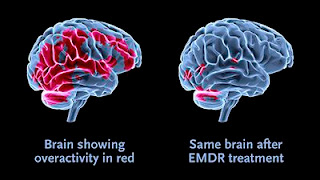Orange County is the pulse of Southern California, known for
its beautiful beaches, lively culture, and innovative therapeutic services such
as Eye Movement Desensitization Reprocessing (EMDR) instruction which has
become a widely utilized technique among mental health professionals to deliver
transformative healing experiences for their clients. This article dives deep
into EMDR
education in Orange County by looking at its significance,
benefits, and possible advancements for treating mental illness in future
years.
Francine Shapiro first introduced EMDR as a psychotherapy
method during the latter half of the 1980s to assist people in overcoming
traumatizing memories, painful experiences, and various psychological
disorders. It consists of an eight-phase process combining elements of
cognitive-behavioral therapy as well as bilateral stimulation like tapping eye
movements or sounds to aid with processing painful memories and provide
emotional healing.
EMDR Therapy Has an Impact
One of the greatest achievements of EMDR Therapy
lies in its capacity to aid those living with trauma-inducing events, whether
that be from war, accidents, abuse, or other sources. Trauma has devastating
repercussions for an individual's psychological, emotional, and physical
well-being - talk therapy may not always provide sufficient healing
breakthroughs whereas EMDR offers distinct and effective solutions.
Orange County provides training on EMDR Therapy.
Orange County has emerged as a center for mental health and
well-being, offering various treatment options to address its residents' mental
needs. One particular training option has received immense praise in Orange
County: EMDR therapy has gained notable attention due to its scientifically
demonstrated efficacy and rising appreciation. Health professionals working in
Orange County recognize EMDR's transformative healing powers for clients in
need, making this effective therapy an integral part of healing their practices
and clients' transformational healing journeys.
Benefits of EMDR Training
Evidence-Based Efficacy: EMDR has been extensively
researched for treating disorders related to trauma. Mental health
professionals who take an EMDR course gain access to an effective therapeutic
method with proven results.
Holistic Healing: EMDR goes beyond simply treating symptoms
to address their source - processing memories of trauma. This approach provides
holistic healing by helping individuals recover and integrate traumatic events
in a healthier manner.
Faster Results As opposed to traditional talk therapy, which
may take weeks or months before showing tangible improvements, EMDR often
brings significant transformation quickly - making it particularly appealing
for those in search of immediate relief and improvement.
Client Satisfaction: The ability of EMDR to bring about
meaningful breakthroughs increases client satisfaction and fosters the
formation of a positive therapeutic partnership. Mental health professionals
trained in EMDR provide their clients with opportunities for healing tailored
specifically to meet their individual needs and expectations.
Multifaceted Application of EMDR: EMDR's versatility goes
well beyond trauma treatment; it can be tailored for various conditions
including anxiety and depression, phobias, and performance enhancement. Mental
health professionals should possess this flexibility as part of their service
offerings.
Becoming an Effective EMDR Practitioner
Training to become a competent EMDR practitioner involves an
in-depth process, providing medical professionals with all of the skills and
experience required for leading successful therapy sessions. This journey
usually includes several key elements:
Fundamental Training As the starting point in their EMDR
journey, mental health professionals begin with fundamental training. This
course offers the theoretical foundations of EMDR as well as its history and an
eight-phase procedure. Participants also learn bilateral stimulation methods as
well as ways to assist clients in navigating reprocessing processes.
Supervised Training Following completion of basic training,
students engage in controlled practice sessions led by an accredited EMDR
consultant. Here they apply their expertise in real-life situations while
receiving instruction and feedback.
Advanced Training For mental health professionals looking to
enhance their EMDR skills, advanced training is an invaluable asset. This
training specializes in handling complicated situations with new techniques as
well as providing tailored applications of the treatment protocol.
Certification and Specialization While certification isn't
necessary for practicing EMDR therapy, some therapists choose to become
accredited EMDR practitioners to demonstrate their dedication and expertise in
this technique. Furthermore, specialists often specialize in using it with
certain populations such as children, veterans, and first-response personnel.
Future of Mental Health in Orange County
Orange County
EMDR instruction could become a pivotal force in shaping how mental
health care will be perceived in the coming years. As more professionals master
EMDR techniques, effective therapy focusing on trauma will become more
accessible, providing healing and hope to more individuals across Orange County
and throughout California.
Orange County's mental health system has taken an innovative
approach by adopting evidence-based methods like EMDR into its mental health
system, in an attempt to meet ever-evolving population demands. By doing this,
mental health specialists in Orange County are aligned with current
developments on this subject matter.
Conclusion
Orange County is witnessing an extraordinary journey towards
healing, thanks to EMDR training.
For people struggling with painful memories and trauma, this process provides
an avenue for recovery free from emotional trauma. As mental health
professionals across Orange County embrace its power for reprocessing sessions,
they are creating an era in which healing becomes reality rather than just a
possibility; one liberated soul at a time.



Comments
Post a Comment